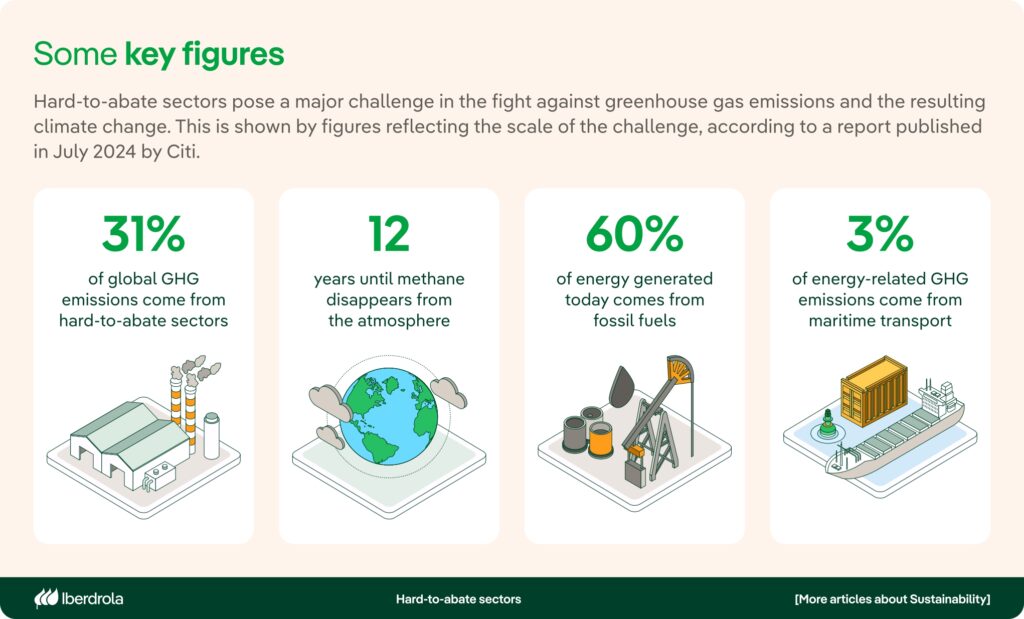Why Hard-to-Abate Sectors Threaten Net-Zero Goals
Achieving climate neutrality in the EU hinges on overcoming the emissions challenges of hard-to-abate sectors.
As part of its climate strategy, one of the EU’s biggest goals is to become the first climate-neutral continent by 2050. If you work in the EU bubble, you’ve probably heard this a lot, but what does it mean? Achieving the climate neutrality target – reaching net-zero greenhouse gas (GHG) emissions – means tackling not only the easy wins but also the most difficult emissions-intensive sectors.
While progress has been made in electrifying cars and homes and promoting solar energy, hard-to-abate sectors still pose a significant challenge.
While progress has been made in electrifying cars and homes and promoting solar energy, hard-to-abate sectors still pose a significant challenge. This includes shipping, aviation, heavy-duty transport, and the production of steel, cement, and chemicals. These industries rely heavily on fossil fuels or involve emissions-intensive processes, and as such, are not currently on track to reach net-zero emissions by 2050, according to IRENA.
Why hard-to-abate sectors matter
These sectors are responsible for a large share of Europe’s emissions due to their energy needs and process-related emissions. Steel, cement, and chemicals release emissions both from high-temperature energy use and chemical processes. Scaling on-site renewable energy for such heat-intensive operations is a key challenge for this sector. Passenger planes and cargo aircraft rely on fossil fuels with high energy density to meet their substantial power and range requirements. The lack of scalable, high-energy-density alternatives to jet fuel makes the aviation sector’s decarbonisation goals harder. Shipping primarily relies on low-grade fossil fuels, making it one of the most carbon-efficient modes of transport on a per-tonne basis. However, its vast scale means the sector still contributes significantly to global GHG emissions. Transport vehicles for goods are responsible for nearly a quarter of all of the transport sector’s carbon dioxide emissions, exceeding the combined emissions from international aviation and shipping. A wider deployment of biofuels is needed to help reduce emissions.

Good practices exist
The EU Sustainable Energy Week (EUSEW) had a dedicated panel discussion on the subject. Ana Álvarez Rodríguez, Head of EU Public Affairs at Repsol, a global energy company, stated that the fuel manufacturing industry is essential for Europe, as liquid fuels do more than 90% of transport in the EU today.
In Cartegena, Spain, renewable fuels are already making an impact. Repsol operates the Iberian Peninsula’s first industrial-scale renewable fuel plant, supplying over 1,000 service stations with renewable options, exemplifying innovation and regional reindustrialisation.
However, to accelerate this transformation, the EU needs to develop a dedicated transition pathway for the fuel manufacturing industry, recognising renewable fuels as a key decarbonisation solution across road, air, and maritime transport.
“We’re calling for a dedicated transition pathway for the EU Fuel Manufacturing Industry, with a value chain perspective in which renewable fuels are recognised as a solution to decarbonise all modes of transport (road, aviation, and maritime),” Ana adds.
Reaching net zero by 2050 requires an inclusive approach. While progress in electrification and renewables is noteworthy, the heavy industries and transport modes that underpin Europe’s economy require equal – if not greater – attention. Solutions like renewable fuels, industrial innovation, and dedicated transition pathways must be scaled and supported with clear policy direction. Climate neutrality will only be achieved by facing the hard parts head-on, not by sidestepping them.